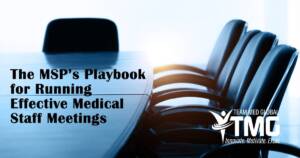 Medical staff meetings are the pulse of a healthcare organization—where critical decisions are made, policies are shaped, and collaboration happens. But without proper management, these meetings can quickly become inefficient and unfocused, wasting valuable time. For Medical Services Professionals (MSPs), the key to running a productive meeting lies in preparation, structure, and clear communication. By mastering these elements, MSPs can turn medical staff meetings into powerful tools for driving organizational success and improving patient care.
Medical staff meetings are the pulse of a healthcare organization—where critical decisions are made, policies are shaped, and collaboration happens. But without proper management, these meetings can quickly become inefficient and unfocused, wasting valuable time. For Medical Services Professionals (MSPs), the key to running a productive meeting lies in preparation, structure, and clear communication. By mastering these elements, MSPs can turn medical staff meetings into powerful tools for driving organizational success and improving patient care.
Here are some best practices for managing medical staff meetings that help streamline operations and foster better outcomes.
Set Clear Objectives
Before any meeting begins, it’s crucial to set clear, measurable objectives. MSPs should work with medical staff leadership to define the purpose of the meeting, whether it’s discussing patient care initiatives, compliance updates, credentialing issues, or operational challenges. Having a focused agenda allows for more productive discussions and ensures that everyone understands the meeting’s goals.
Action Tip: Distribute the agenda with the objectives at least a week before the meeting so attendees can prepare.
Create a Structured Agenda
A well-structured agenda is the backbone of an effective meeting. The agenda should prioritize urgent and critical matters, leaving room for open discussion toward the end. Be realistic about the time allocated for each topic, and stick to it to avoid running over schedule. MSPs play a vital role in shaping the agenda to reflect the organization’s priorities and compliance needs.
Action Tip: Use a standardized format for the agenda, including time allocations for each discussion item, and ensure the chair or facilitator keeps the meeting on track.
Encourage Participation and Collaboration
Meetings can easily become unproductive if only a few voices dominate. MSPs should work with leadership to encourage participation from all attendees. This creates a more inclusive environment where everyone feels valued and heard, which can lead to better decision-making.
Action Tip: Use tools like a round-robin format or specific time slots for different departments to ensure balanced participation from all members of the medical staff.
Stay on Track and Respect Time
Time management is one of the biggest challenges in medical staff meetings. MSPs can help ensure meetings run efficiently by closely adhering to the agenda and keeping discussions focused on the topics at hand. It’s essential to start and end meetings on time, as busy healthcare professionals have tight schedules.
Action Tip: Appoint a timekeeper who can gently remind the group when it’s time to move on to the next topic. Use tools like a countdown timer to stay on track.
Use Technology to Enhance Efficiency
Technology can be a valuable asset in managing medical staff meetings. Use software tools for scheduling, distributing materials, and taking minutes. Virtual meeting platforms allow greater flexibility for remote staff members to participate. MSPs can leverage technology to enhance communication, especially when working across multiple departments or locations.
Action Tip: Use shared online platforms to distribute agendas, gather feedback, and share meeting minutes to ensure everyone stays in the loop.
Document Key Decisions and Assign Action Items
One of the most critical aspects of effective meeting management is ensuring follow-through. MSPs should document key decisions, assigned action items, and deadlines. This keeps everyone accountable and ensures progress between meetings.
Action Tip: At the end of the meeting, review all action items, who is responsible for each, and deadlines. Send out a summary or minutes shortly after the meeting to reinforce accountability.
Ensure Compliance with Regulations
Medical staff meetings often cover compliance-related topics, such as credentialing, privileging, and regulatory changes. MSPs should ensure that the meeting structure allows time for discussing any compliance issues and that these discussions are documented appropriately for auditing purposes.
Action Tip: Keep a record of all compliance-related discussions, especially those involving accreditation standards or legal requirements, to ensure proper documentation for regulatory bodies.
Review and Improve Meeting Processes
MSPs should continuously review and refine the meeting process. After each meeting, gather feedback from participants to identify areas for improvement. Were the objectives met? Did the meeting stay on track? Were all voices heard? By reviewing these aspects, MSPs can make each meeting more efficient and effective.
Action Tip: Use a brief post-meeting survey to gather feedback and implement suggestions that can improve future meetings.
Effective medical staff meeting management requires a combination of careful planning, clear communication, and efficient execution. MSPs are at the center of ensuring that meetings are productive, collaborative, and focused on achieving organizational goals. By following these best practices—setting clear objectives, creating structured agendas, encouraging participation, and documenting key outcomes—MSPs can ensure that medical staff meetings contribute to the overall success of the healthcare organization.

